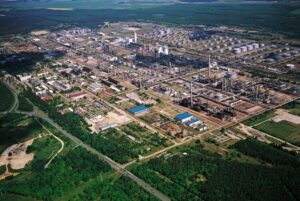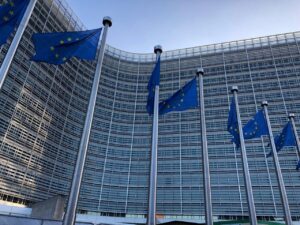Meeting of the presidents of Poland and Hungary as part of the Polish-Hungarian friendship days celebrated for the twelfth time. To Veszprém, the capital of the commune with the same name, located just above Lake Balaton – writes Dr. Dominik Héjj, a co-operator of BiznesAlert.pl.
Although the main purpose of the visit was to celebrate the millennial heritage of friendship, there were political discussions. On the agenda outlined by the President of Hungary there were three main areas: infrastructure development, including the construction of north-south corridors from Szczecin to the Croatian port of Rijeka, as well as road connections, the one on which the Polish side depends the most – from Miskolc to the border with Slovakia as part of the European road E71 (in Hungary M30), it is to be ready by 2022. This is part of the Via Carpatia road, the flagship infrastructure project under the Three Seas Initiative. During the meeting, also the possible creation of the Three Seas fund was discussed, from which it would be possible to finance joint initiatives coming from this political project among 13 countries. President Duda pointed out that this idea will be taken before the next summit of the Three Seas Initiative, which will take place in Romania.
Diversification of gas supplies? Blame everyone around
– In many cases, we have absolutely convergent views, we discuss several of them – said Andrzej Duda at the beginning of his speech during a press conference. A certain complement to this thought were the following words during the ceremony: We are friends in every inch, and although of course there are disputable issues between us, we can talk about them, we can explain each other, we can be friendly to each other, we can be kind to each other – and these are the greatest values – This is true, because energy issues, mainly related to energy security and the issue of energy supply diversification, are very different. One can stand it for a particular attitude – the Polish president speaks about particulars and plans, the Hungarians either motivate themselves or make them burden their partners with other politics. This is clearly demonstrated by the example of gas cooperation.
Poland is constantly pushing for the creation of a gas corridor on the North-South axis. From the LNG terminal in Świnoujście to the Croatian, still unfinished terminal in Krk as part of the Three Seas Initiative. President Duda also indicated this, pointing out that Croatia is considering the purchase of a floating gas port, and also that in order to build a gas corridor on the North-South axis. – We want to use the infrastructure we already have and build new one – said the president. In turn, President Áder emphasized that in order to talk about the diversification of gas sources, infrastructural conditions must first be met. Undertaking new initiatives in this area as well as adapting old infrastructure. At the same time, he added that he was happy that Poland would build its connection with Slovakia (Prime Minister Viktor Orbán said in a TVP interview in January), and that Hungary already has the necessary infrastructure.
Croatia is basically like a mantra, a repeated spell intended to justify this and not another energy policy. Let’s reach the end of July last year, when the Three Seas summit took place in Warsaw. The day before it, the head of the Hungarian diplomacy went to Moscow to sign an agreement on cooperation with Gazprom. He said then: – (…) The Croats also did nothing to build an LNG terminal on the (island) Krk, so what are we talking about?” Romania was also blamed then. Today, the President of Hungary says: „We would love to have such a terminal built in Croatia. Unfortunately, these works have not been started yet. We have already created technical conditions to receive this gas on our border. ” So continuation. We did all, you did not, and therefore we have no choice but to buy gas from somewhere else.
Hungary’s unclear attitude towards Nord Stream 2
From the Polish perspective, perhaps the most crucial political issue of the visit in Hungary was the answer to the question about the attitude of the Hungarians towards Nord Stream 2. The Polish government is showing a joint protest written in March 2016 for the European Commission signed, among others by Hungary. The document, however, is one thing, political practice is something different.
This statement is extremely unclear. Even fluid. If you enter the term „Nord Stream 2” on the Hungarian government’s website, we have at your disposal all zero articles. It is different if you enter the term in Hungarian. We have the last material from July 2017. A topic that does not exist at all. Some of the last declarations were not from the representatives of the Hungarian government, and President Vladimir Putin, who a year ago in Budapest, during a joint press conference, indicated that Hungarian companies might be involved in the construction of a new gas pipeline. In turn, the head of the Ministry of Foreign Affairs Péter Szijjártó said then that Nord Stream 2 is not being built by Hungary, but companies from Germany, France, Italy, perhaps also Austria.
A similarly vague vision was presented by President János Áder. He talked long, roundly, finally did not reveal what the attitude of the country is. Certainly it is conditioned by the political and international situation. Those who listened to the strong tone of President Duda, talking about the dangers of building Nord Stream 2, the fact that it is a political initiative, which has no reason to exist, could at least feel disappointed.
Signals from Hungary
But you can get the impression that something has twitched. And the key word here is „impression”. Well, in his annual speech, which Viktor Orbán is giving in February, there was an assurance that gas will flow to Hungary from Poland (LNG terminal) as well as Romania. A few days earlier, the Prime Minister of Hungary announced his interest in signing a supply contract of around 4 billion cubic meters of natural gas from Romania after 2022, and therefore after the end of the current agreement with the Russian Gazprom. The gas is to be delivered from the Neptun deposit. It should also be considered that at the end of October last year, Hungarians along with Slovaks, signed a memorandum for the Eastring gas pipeline, which, depending on the political situation, may either favor the diversification of Caspian gas from the Southern Gas Corridor, which supports the European Commission or even conversely, to deliver Russian gas under Nord Stream 2.
But one must bear in mind Orbán’s words from a year ago, when he was saying, during a conference with Putin that it does not matter what way and how, but still Russian gas will flow to Hungary. The geopolitical situation has not changed over the year. We are certainly closer to the end of the current agreement, negotiations are underway, and communication of new sources of gas is aimed mainly at, if not fully, increasing the negotiating position of the government with Gazprom. This thesis is possible to defend, that the Prime Minister of Hungary again declares the reduction of energy prices on a large scale. For now, it is impossible to do so without the Russians. And those, changing the terms of the contract in 2015, allowed the funds saved to fund all sectoral increases to this day.
Summary
Lack of support for Hungarians in a key matter for Poland should not go unnoticed. However, it is the result of hard political pragmatism, in which tangible financial benefits are subject to political alliances. And this should also be taken into consideration before categorical judgments. The real „check” will be the dedication of the Polish-Slovak section, as well as the LNG terminal in Croatia. What’s convenient, it will not happen in the near future.








